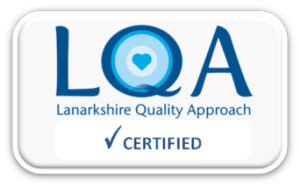Nutritional support towards the end of life
Information for patients
NHS Lanarkshire Nutrition and Dietetic Department
PIL.ENDLIF.22_12579
Reduced appetite, thirst, weight loss and swallowing difficulties are normal when someone is nearing the end of their life. We know this can be a difficult time. Although you may have concerns about how little someone is eating or drinking, an assessment by a Dietitian is not always needed. The advice in this leaflet can help you support the person to get comfort and enjoyment from what they are able to eat and drink.
Tips to help someone to eat and drink…
- What someone wants to eat may vary from day to day depending on how they feel. It can be helpful to have a list of things they like and don’t like for anyone who is giving support but doesn’t know this. You may feel anxious and want to encourage them to eat and drink, but don’t ‘force feed’ them as this is not helpful and can make them feel distressed.
- Try giving them smaller portions, and offer food and fluids regularly throughout the day. We encourage snacking so do not worry if they do not want to eat a full meal.
- Try adding extra energy and protein to their food e.g. adding cream to dessert or porridge, butter to potatoes or vegetables, soft cheese in soups, pastas or potatoes and full cream milk in drinks and cereals. Add skimmed milk powder to full cream milk, puddings and sauces.
- Avoid giving them low fat, light or ’healthy’ choices. Use the regular variety of food or drinks instead.
- Avoid giving them large drinks at meal times or before meal times as this can make them feel full. Encourage drinks between meals instead.
- There are over the counter nutritional products that you can buy e.g. Meritene or Complan. These can be flavoured or unflavoured.
- Coughing and spluttering may occur. This is ok as long as the person is not distressed. If they are distressed:
- Offer them small amounts of food using a teaspoon
- Stop and try again later as their swallow may vary at different times
of the day - Make sure the person is awake enough to eat and drink
- Encourage them to be as upright as possible
- Follow any advice you may have been given by a Speech and Language Therapist
Other things to consider…
- You may find that they have more energy at different times of the day. This can be a good time to try to encourage food and drinks.
- If they wear glasses, false teeth or a hearing aid, ask if they want to use them when they are eating or drinking.
- Encourage fresh air before offering food. Cooking smells can be off putting especially if a person feels sick.
- Make mealtimes as relaxed as possible. Encourage the person to sit upright if they can.
- If someone is being cared for in bed, cover any medical equipment and remove commodes before offering food.
- Try eating together even if it is just a small amount. This can be a good chance to speak about times where you have enjoyed that food before. Good examples are ice cream on a holiday or fish and chips after a day out. This can make eating more enjoyable and less stressful.
- Regular mouth care can be helpful especially if someone has a dry mouth.
- If constipation is a problem encourage them to drink regularly as much as they are able.
- If the person is in pain, feeling sick, being sick, constipated or having diarrhoea, speak to their health care team. They may be able to review medication or recommend things to help manage these symptoms.
- If you need any further support or information, please contact the person’s healthcare team.
Further Information
You should be referred to see the diabetes dietitian for further information and individual advice.
Pub. date: June 2022
Review date: June 2024
Issue No: 01
Reference: PIL.ENDLIF.22_12579
If you need this information in another language or format, please e-mail:




